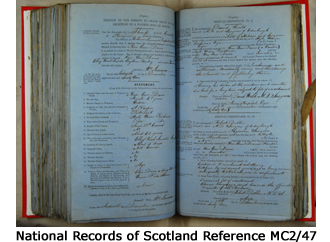
To trace our Scottish family tree we begin by searching for birth, marriage and death certificates. Before 1855 we use church records but all too often we cannot find the records we need.
There are many reasons for ‘missing’ baptism records. It may be that the register was lost or damaged. By the mid 1800s, there were many different church denominations in Scotland, meaning you may need to look at many separate registers, not all of which are available online. To find out how to do this, visit our Learning Zone:
Births, Marriages and Deaths in Scotland before 1855.
Even when you make a careful search, however, it may be that no baptism survives and you seem to have hit a brickwall in your research.
What we need to do now is be more imaginative, looking beyond the obvious records. In Scotland, a ‘
designation’ is given in certain types of documents, particularly legal records. This designation was given to distinguish one person from another. At a time when many people did not know their date of birth and they certainly didn’t have a National Insurance (or Social Security number) or a postcode (or zip code), something was needed to identify the person mentioned in a document.
What is included in a Designation?
Generally, a designation will include the person’s name, residence and occupation. In the case of a child (and some adults) the father’s name may also be given along with his occupation and residence (it may also be stated that he is deceased). This information could help you get over a brick wall and continue on with your research.
Did you know?
A designation is the addition or description of a person. It is necessary in legal documents to design or identify the parties in such a manner as to distinguish them from all others; and in practice this was done by setting down the title of nobility, or the name and surname of the party, with his addition or description, by his estate, profession, trade, or place of residence. In certain instances it would also include the name of the party’s father.
 |
| The National Records of Scotland |
Where do we find designations?
Legal records always give a designation. These may be criminal court records, wills and ordinary (civil) court records (such as ‘
Actions of Affiliation and Aliment’) and sasine records (property records).
No matter what social class our ancestors were, there may be a legal record that survives and this could be the key we need to unlock our family tree.
Finding legal records
Wills are an easy place to start. Many Scottish wills are available on
ScotlandsPeople and the index is free to search. You can search many
sasine records (property records) in the National Records of Scotland.
We have indexed many
Sheriff Court records and we update our index most weeks. You can search these for free (with no login or subscription) and just order the entry you need. Our index includes the designation.
Click to see the entry for Agnew versus Carter in 1859, notice the pursuer is named as “Jane Agnew, daughter of and residing with John Agnew, Mason, Knockbrex, Penninghame”. We have also indexed some sasine records and deeds and we plan to add more.
Although
prison registers do not generally give a ‘designation’ they do give an age and birthplace which can be helpful. The registers also tell us which court heard the case, and when the court records survive these give a designation. When you order a prison record from us we will tell you if there is (or may be) a corresponding court record. In fact generally, the person’s address is sufficient to identify which ‘John Smith’ we are talking about.
What to do next
Look over your family tree brick walls, which legal records might your family appear in? Did they own property, or were they more likely to end up in prison? Is there an
illegitimate child in the family? Could there be a Sheriff Court record? Did your ancestor learn a trade? Then there may be an apprenticeship record.
Did you know?
Small words mean a lot!
‘Or’
Historically women were always recorded with their maiden surname in Scots legal documents. By the 19th century, it was the usual practice to record women with both maiden and married surnames in legal records. Let’s say our ancestor was born Margaret Scott and married James Thomson: we would expect to find her recorded as ‘Margaret Scott
or Thomson’.
‘At’, ‘In’ and ‘Of’
The way the residence of a person is recorded is also important. The small words ‘at’ ‘in’, and ‘of’ all mean very specific things.
You can see the following example
here on our website. “Aeneas McPherson
of Flichity & Lachlan McIntosh
in Nessendally” - Aeneas is described as ‘
of Flichity’, the small word ‘
of’ (instead of saying 'in' or 'at') shows that Aeneas McPherson had heritable possession of Flichity. This is a clue to more records. Lachlan, on the other hand, is described as “ Lachlan McIntosh
in Nessendally” meaning Lachlan was a tenant of those lands.
In other records a person may be described as ‘
at’ a place, this would indicate they were an occupier, not a tenant or owner.
Understanding these small, but significant words, can unlock your family tree. If you need more help
just get in touch.



















